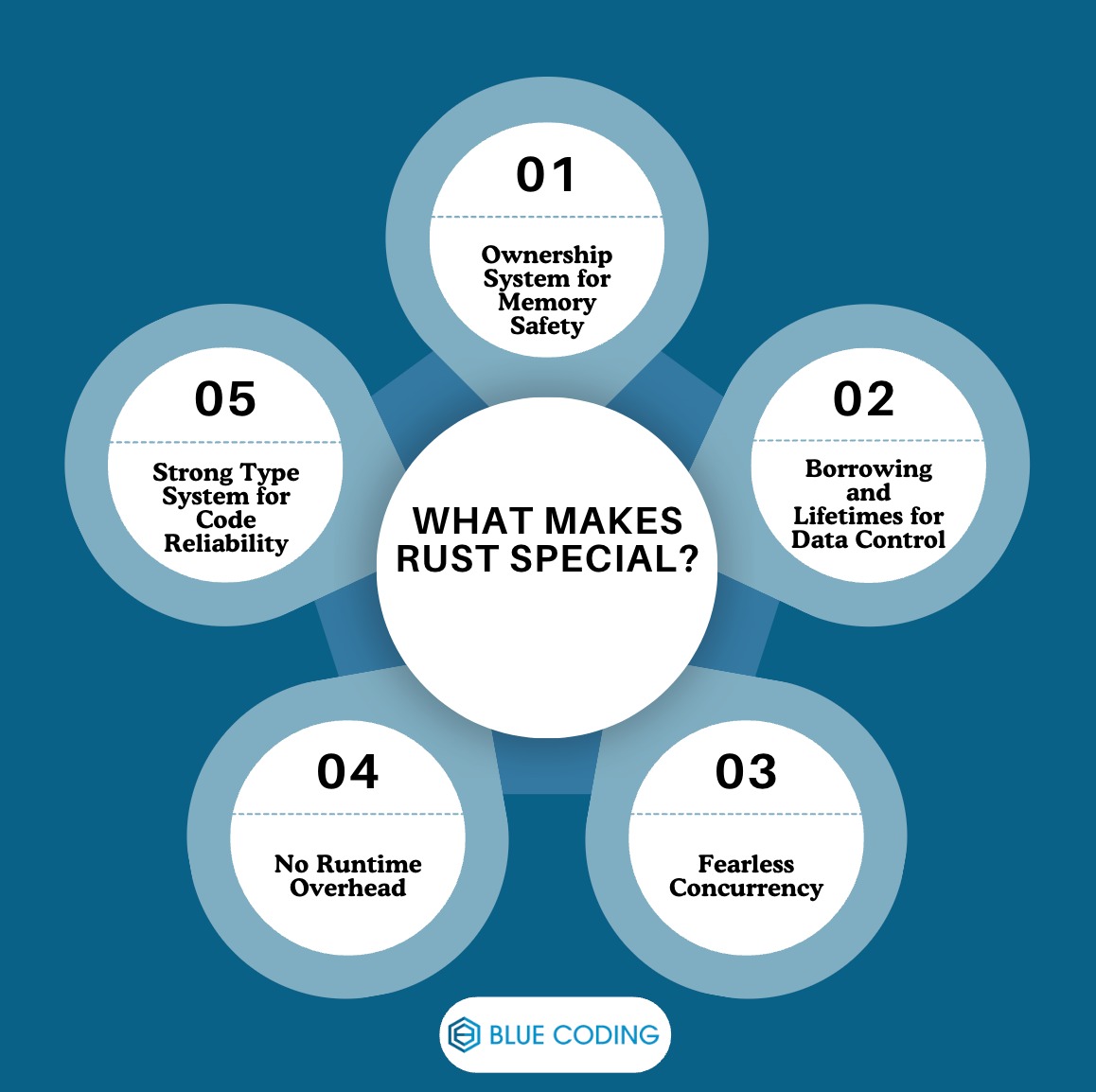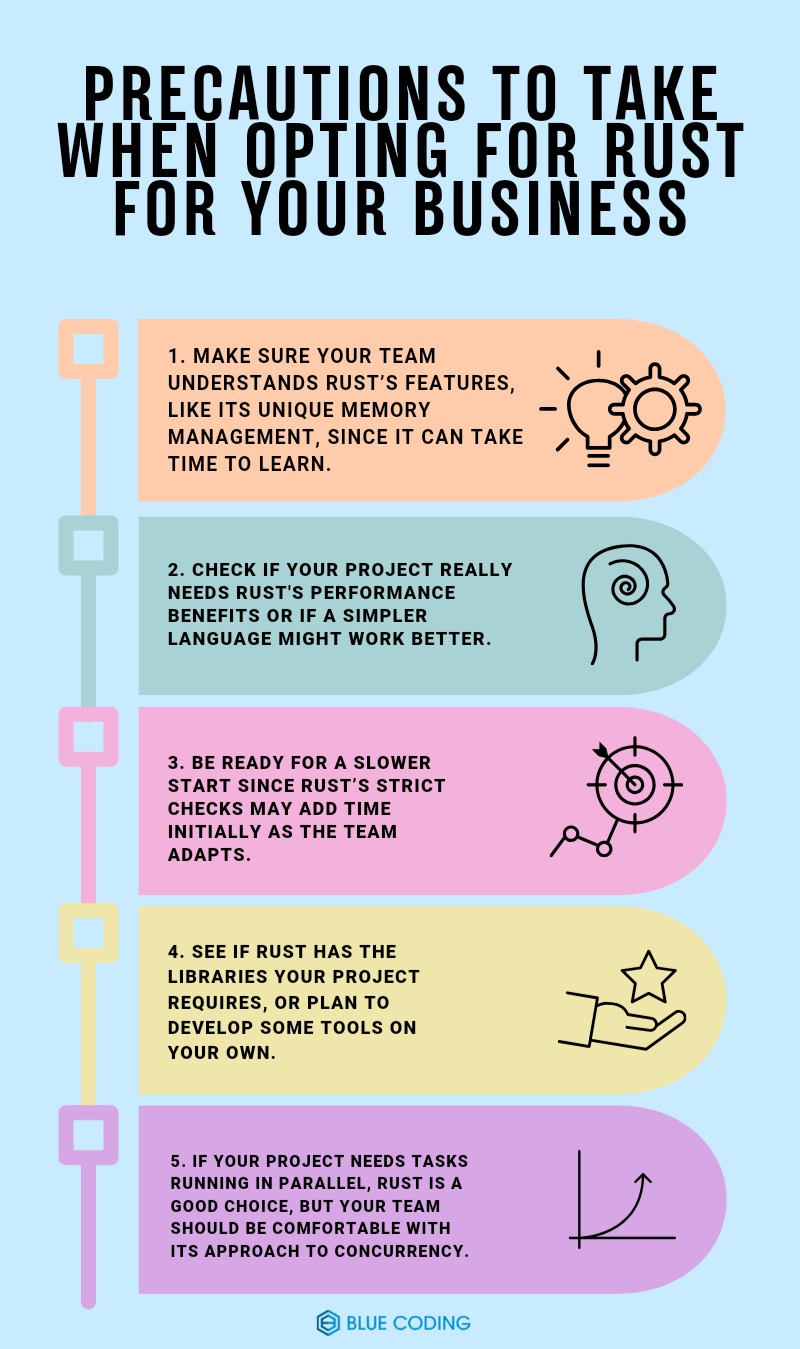 News
News
Rust is a modern programming language designed for safe and efficient system-level programming. Created by Mozilla, Rust addresses common problems seen in other system languages, like C and C++, such as memory errors and safety issues. It uses a strict compile-time memory safety check to prevent bugs, making it reliable and highly suitable for developing low-level applications, like operating systems, web browsers, and other performance-critical software.
What Makes Rust Special? Rust Explained The Right Way!

We did give you a brief overview of what Rust programming is but let's go ahead and learn more about the Rust programming uses in detail. In this section, we'll analyze what makes Rust unique and stand out from other programming languages.
Ownership System for Memory Safety ➠
One of the most unique features of Rust programming is its ownership system, which provides memory safety without needing a garbage collector. Rust’s ownership model ensures that each value in memory has a unique owner, and when that owner goes out of scope, the value is automatically cleaned up. This prevents memory leaks and dangling pointers, which are common issues in other system languages like C and C++. By checking memory usage at compile-time, Rust catches errors early, creating safer and more reliable code.
Borrowing and Lifetimes for Data Control ➠
Rust’s concepts of borrowing and lifetimes add another layer of control over data access and memory management. Borrowing allows data to be accessed by multiple parts of a program without transferring ownership, ensuring that memory is managed safely. Lifetimes help the compiler track how long references to data should live, preventing invalid access and ensuring that data is not used after it has been freed. This system allows for efficient, safe sharing of data across different parts of a program.
Fearless Concurrency ➠
Concurrency, or running multiple tasks at once, is often challenging in system programming due to the risk of data races and other threading issues. Rust’s ownership and borrowing systems make it easier to write concurrent code by ensuring that data is accessed safely across multiple threads. Its strict compile-time checks prevent data races, making it “fearless” in concurrency. This means developers can safely write parallel code that is more efficient and responsive without risking complex, hard-to-find bugs.
No Runtime Overhead ➠
Unlike many modern programming languages, Rust has no runtime or garbage collector, which means it doesn’t add any background processes that might slow down execution. Rust’s programs compile directly to machine code, allowing them to run at speeds comparable to C and C++. This absence of runtime overhead makes Rust ideal for performance-critical applications, where every millisecond counts, such as in gaming engines or operating systems.
Strong Type System for Code Reliability ➠
Rust’s strong and static type system ensures code reliability and helps catch errors at compile time rather than at runtime. Its type system is strict, preventing common bugs like null pointer dereferencing. Additionally, Rust’s type inference makes the language easier to use, as the compiler can often figure out types automatically. This combination of strictness and flexibility results in cleaner, more reliable code that’s easier to read and maintain.

Benefits of Learning Rust Or Implementing It In Your Business
High Performance Without Compromise:
Rust’s efficiency in managing system resources makes it as fast as traditional languages like C and C++, yet with fewer risks of errors. Rust compiles to machine code directly, meaning it can run quickly without needing a runtime environment, like many other high-level languages. This allows Rust to achieve great speed and low memory usage, making it ideal for creating real-time, responsive applications.
Memory Safety and No Garbage Collection:
A major advantage of Rust is its unique approach to memory management. Unlike many languages that rely on garbage collection, Rust enforces strict memory safety rules through its ownership model, which checks memory usage at compile time. This ensures that memory-related errors are caught before the program runs, leading to safer and more stable software without the need for an external garbage collector, which can slow down execution.
Concurrency Made Easy:
Concurrency, or the ability of a program to perform multiple tasks simultaneously, is often complex and error-prone in low-level programming. Rust’s design simplifies concurrency with features like ownership and thread safety, making it easier to write parallel programs without risking data races or deadlocks. Rust’s borrowing checker ensures safe handling of data across threads, promoting efficient multitasking.
A Strong Type System for Error Prevention:
Rust’s type system is another essential feature for system-level programming. It uses strict typing rules, making code predictable and reliable by preventing many common bugs. Types are checked at compile time, which helps avoid runtime crashes. This strong typing also makes it easier to refactor code, as potential issues are highlighted early in development, saving time and effort.
Growing Ecosystem and Community Support:
The Rust programming ecosystem is expanding, with an increasing number of libraries, tools, and community resources. The language’s official package manager, Cargo, makes it simple to manage dependencies and build projects. The supportive Rust community provides ample learning resources and helps new developers get comfortable with the language, fostering an inclusive environment that encourages Rust’s growth and adoption.
Widely Trusted by Developers and Companies:
Due to its performance and safety, Rust has gained widespread recognition among developers and large companies. Tech giants like Microsoft, Amazon, and Dropbox use Rust in their production code to improve efficiency and reduce bugs. Rust has consistently ranked highly in developer surveys, being favored for its reliability, safety, and potential in large-scale projects.
Cross-Platform Support:
Rust is a cross-platform language, meaning code written in Rust can run on multiple operating systems, such as Windows, Linux, and macOS, with minimal adjustments. This flexibility makes it easier for developers to build software that works across different environments, saving time and simplifying the development process.
Reduced Debugging Time:
Rust’s strict compile-time checks mean that many common errors are caught early in the development process, reducing the need for extensive debugging later on. By ensuring code correctness before it runs, Rust helps developers spend less time fixing errors, allowing them to focus on building features and improving performance.
Excellent Documentation:
Rust is known for its clear and thorough documentation, which makes it beginner-friendly and easy to learn. Rust's official documentation includes examples and explanations that help both new and experienced developers understand how to use the language effectively. This strong documentation support speeds up learning and helps developers troubleshoot issues independently.
Strong Community Libraries:
The Rust community has created a wide range of libraries, covering everything from network programming to graphics. These libraries save developers time by providing pre-built solutions to common tasks, making it easier to implement features without having to code everything from scratch. Community libraries are updated and well-maintained, ensuring reliability for developers.
Secure Coding Practices:
Rust was built with security in mind, offering features that prevent common vulnerabilities, such as buffer overflows and memory leaks. This focus on security makes it a good choice for projects where data protection is essential, like financial systems or security software. Rust’s design encourages safe coding practices, reducing risks and improving overall software security.
Security Concerns To Keep In Mind When Opting For Rust
Rust is a powerful language with strong safety and performance features, but taking these precautions can ensure a much safer performance and better outcomes for business projects.
Assess Team Expertise
Ensure your team has a good understanding of Rust's unique features, like ownership and borrowing. Rust has a learning curve, so allocate time for training if your team is new to it.
Consider Project Requirements
Rust is ideal for performance-critical applications, but it might be more complex for simple projects. Evaluate if the project genuinely needs Rust’s low-level control or if a higher-level language might be more efficient.
Plan for Longer Development Time Initially
Rust’s strict compile-time checks make code safer, but it can increase development time, especially for those new to its rules. Prepare for an initial slow pace as your team adapts, which will improve over time.
Review Available Libraries
Rust’s ecosystem is growing but may not offer as many libraries as older languages like JavaScript or Python. Check if Rust has the libraries you need for your project, or if you’ll need to build some tools yourself.
Focus on Concurrency Needs
If your project requires high concurrency, Rust is a great fit, as it helps manage parallel tasks safely. However, ensure your team is familiar with its concurrency model to avoid potential complexity and errors.
Check for Community Support
Rust’s community is active and supportive, but it’s still smaller than those for other popular languages. Confirm that there’s enough community support and resources to help with troubleshooting and answering questions that may arise during development.
Evaluate Long-Term Maintenance
Rust’s strict safety features make code reliable, but these same features can make it challenging to modify later. Ensure that your team is prepared for ongoing maintenance and updates, especially as new developers might find Rust’s rules challenging.
Budget for Tooling and Integration
Rust’s tooling ecosystem is improving, but integrating it with existing systems or workflows may require additional effort. Plan for any extra setup costs or time needed for tools, like setting up build systems, testing environments, and other workflows that support Rust projects effectively.
Hire Remote Developers Skilled in Rust With Blue Coding
A lot of companies now choose to outsource their software development needs to remote developers based in Latin America. Our blog post on why Latin America has become a prime nearshoring destination will help you understand this more in detail. Blue Coding is a reliable outsourcing agency that has delivered top quality services for over ten years. We prioritize customer satisfaction and data security. To learn more about how we can help you with your specific project, contact us now and book your free strategy call.



